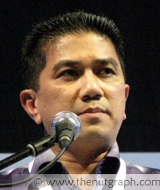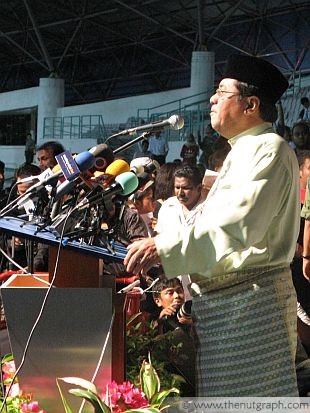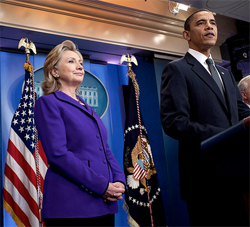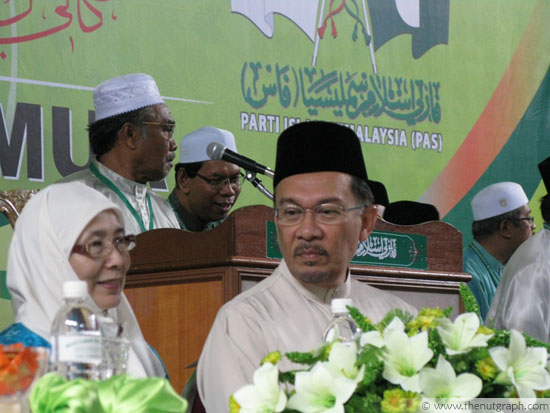
PARTI Keadilan Rakyat (PKR) has become the first major Malaysian political party to hold direct elections which are currently ongoing. The elections will allow the party’s approximately 400,000 members to vote directly not only for their division chiefs but also their president, deputy president, vice-presidents and supreme council members.

The elections has already seen some fierce contests and more is likely. Will Azmin Ali, who is popular with the grassroots, win the deputy presidency? Or will relative party newcomer Datuk Zaid Ibrahim be able to persuade members that he is more suitable to lead now that he has confirmed he is running for deputy presidency?
Will these direct elections strengthen PKR‘s democratic image or will it only expose factionalism and the party’s political inexperience? What is the significance of these elections for PKR and ultimately, for the Malaysian political scene? The Nut Graph asks political scientist Wong Chin Huat.
TNG: What is the significance of PKR’s direct elections?

Wong Chin Huat: The most significant meaning of the PKR elections is the election of a de facto heir for Datuk Seri Anwar Ibrahim. This is in the event that he is put behind bars or cannot exercise his leadership for any other reason. As Anwar is also the leader of Pakatan Rakyat (PR), his elected heir may also assume this position, depending on his or her acceptability to PR’s component parties and the Malaysian public.
The second significance of the party elections is the renewal of party leadership in general. Despite denials by the likes of Tan Sri Khalid Ibrahim, winners will have a better chance to stand as candidates in the next general election. And should PR win at the federal level in the next elections, some of the winners will become ministers at federal and state levels.
What are the different scenarios that could potentially emerge from the PKR elections? What kind of impact would each of these scenarios have for politics in Malaysia?
Several scenarios may emerge depending on the mode of competition, voters’ participation and the unity of the elites after the elections. These scenarios are not exhaustive but relevant for analysis.

The best scenario is one [of] heated competition, based on debates on policy and programs that the party should embark on to lead the country, and based on what the candidates can offer. This would energise party members, resulting in high turnout and interest. This would be followed by rivals quickly closing ranks post-elections, similar to the Obama-Clinton primary contest in 2008.
Another scenario would involve heated competition based on personal attacks and horse-trading. This may or may not energise the party membership depending on the resources poured in and the party’s overall image. Party leaders would also close ranks after elections with some consolation appointments made to pacify the losers. This will then be a positive party election ala Barisan Nasional (BN) where generational renewal happens. But the public is unlikely to feel inspired.
The worst scenario is one in which heated competition leads to a split of the elites and an exodus of voters, regardless of how involved party members are. This will send a signal to many skeptical Malaysians that PKR is just another pack of greedy and power-crazy politicians.
The scenarios will have significantly different impact on the next general election. If the first-ever direct party elections is one of positive competition based on vision and calibre, PKR and PR will outshine Umno and BN. It will help galvanise popular support for the next elections.
The second scenario will probably not change the balance of power much between parties and will only provide continuity should Anwar be imprisoned. On the other hand, the worst scenario may see PKR’s decline, and even fasten the pace of Anwar’s trial and Parliament’s dissolution.
What are the advantages of direct elections? How will it help or hinder the calming of the tussling factions within the party?
Direct elections may bring three advantages. First, it allows the party to have a sense of ownership and makes members more supportive of the party. Second, it makes vote-buying difficult if not impossible. Third, as the pool of electorate increases from a few thousand to hundreds of thousands, the party electorate is likely to elect leaders who are more in line and in touch with what the national electorate desires. Hence, this would improve the party’s chances in the general election.
Direct elections may or may not aid factionalism in the party, depending on how the factions and elites organise themselves. If competition can be fought based on visions and policies, rather than personal attacks, then even if factions emerge, they are more likely to work together after the elections as long as the ideals are not exclusive and opposite to each other. The debate for the Youth Wing chief elections is the way to go.
Datuk Seri Dr Wan Azizah Wan Ismail has been party president since its inception. Is it time for her to step down so that there can be fresh and more decisive leadership? What is the value of her staying on as party president?

Wan Azizah has been a good figurehead for the party. She is gentle and respectable, giving her soft power to win public support and also some influence to arbitrate in conflicts between party leaders if necessary. In times of crisis, as Anwar’s wife and in her own right, she can be what holds the party together. But the position of Anwar’s heir is what matters in determining whether or not the party can move forward.
Would it be better for the party if Anwar Ibrahim were to contest the party presidency?
Should Anwar contest and win, the party will officially be headless if he is imprisoned. Then the party will need to elect a deputy. Retaining Wan Azizah saves the party this problem. Also, it will look awkward should Anwar and his wife team up to run for the top two posts.
However, to have a de facto party leader whose position is not provided for in the party constitution is simply unconventional and undemocratic for normal political parties. It confirms critics’ accusation that PKR is just Anwar’s fan club. This perception will be solved once PKR has a really powerful No. 2 who can succeed Anwar if necessary.
Would Azmin Ali or Zaid Ibrahim be suitable to take that No. 2 position? What kind of leadership would either of them provide to the party?

Zaid’s strength lies in his well-articulated stance and principles on national issues. To put it bluntly, he looks more like a deputy prime minister than Azmin Ali who is, no doubt, a good organiser.
However, Malaysia is not a presidential state where the chief executive can have a free hand to pick his or her own team. A leader in the parliamentary system needs to work with his or her fellow parliamentarians and cabinet ministers to run the country. So, you can’t have a maverick run the country. Zaid‘s controversial statements have clearly alienated many of his party colleagues, making Azmin look more like a better No. 2 by default. ![]()
Wong Chin Huat is a political scientist by training and a journalism lecturer by trade.
Read previous Uncommon Sense columns
[related-posts]


Hoyohoyo says
It is interesting how there’s no question about the disadvantages of direct elections, which in my opinion are plenty, especially when these elections are implemented without detailed action plans and political maturity.
What’s more interesting is that while PKR allows direct elections to all seats at the central level – including the MT, Wanita and Pemuda wings – no elections are conducted for state-level leaders. Considering Malaysia is a federation, it makes one wonder why there’s no state-level elections when there are “one member one vote” elections at branch, division (parliamentary constituencies) and national levels.